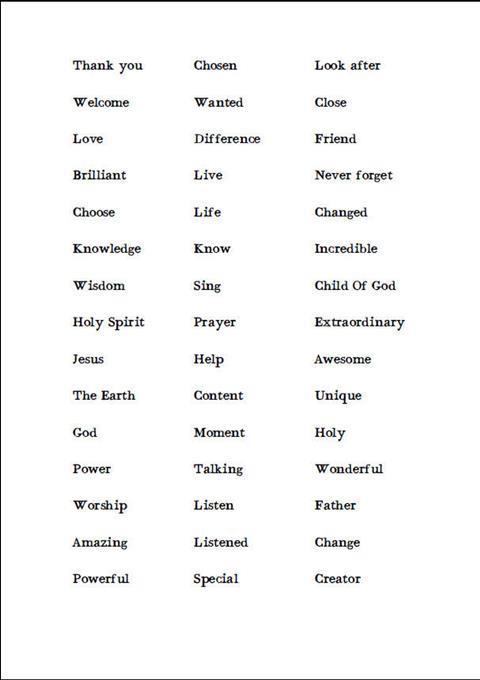
Download the words here.
Hokey Cokey Kareoke
10 mins
Introduce the ‘singing’ theme of this session through this silly game. The group stands in a circle and sings the Hokey cokey. Start again, but pause at the ‘left hand’ bit and point at a young person who shouts out a popular singer or band (someone well known to the group). Continue with the Hokey cokey (‘you put your “Adele” in, your “Adele” out...’) until ‘you do the…’ – at this point, point to another young person who has to shout out a song by that artist (eg. ‘Hello’), and continue with the verse. When you get to the chorus (‘woah, the Hokey cokey’), the group instead has to sing the suggested song at the top of their voices, while doing the running in and out actions, joining together at the end with, ‘knees bent, arms stretched, rah-rah-rah!’. Repeat with new artists and songs until everyone is exhausted!
Introduction
10 mins
Say: Zephaniah is a short book (just three chapters) of prophesy, written around 2,600 years ago. The first two and a bit chapters focus on God’s judgment – his people, Israel, and the rest of the world, have turned away from honouring him. There are some pretty scary verses in there as God outlines the consequences of their sin. But in chapter three, things take a real U-turn. Read Zephaniah 3:14-20 and discuss:
• Why do you think God is angry with his people at the start of this book? How might they be acting?
• Can you think of any modern day examples of things that might make God angry? (Using some recent newspapers, ask the group to pick out a couple of news stories that sadden or anger God, where people have gone against his will eg. terrorist attacks, climate change.)
• Do you think people in these examples should be punished for bad things that they’ve done? How? This passage shows us that God will take away his punishment and save the people - how does that make you feel?
Vip Pass
5 mins
Say: Imagine being at your favourite singer’s concert, surrounded by thousands of people screaming their name and singing along. Then they announce that they’re going to sing their biggest hit and dedicate it to their favourite person in the world. They reveal that person is in the room tonight and that they are excited to sing directly to them. The spotlight turns on you as they say your name and start singing to you. How would you feel? (Get reactions from the group - embarrassed, proud, loved?) You would probably grin through the rest of the concert and all the way home, feeling really special and important. You might expect that you’d get VIP treatment too: going backstage, jumping queues and generally being treated like royalty.
What if God was to sing about you in the same way? How would that make you feel? Read Zephaniah 3:17. God is the creator of the whole universe and knows everything about you, and he picks you out to ‘rejoice over you with singing’- that’s much bigger than Justin Bieber or anyone else singing to you!
Key Point 1
Sometimes we feel like we’re not significant or special, but Zephaniah 3:17 reminds us that God isn’t grumpy about loving us; he’s so very in love with us that he can’t help but sing over us with joy!
Discussion
15 mins
Ask the group to discuss these questions:
- Can you think of a time when you’ve felt loved by God? What happened?
- What are some of the things that make us feel we’re not special or loved?
- Do you find it easier to remember the good or bad things about yourself?
Ask the group to raise their hand (without asking them to share) when they can think of three negative qualities about themselves (or that others have said about them) and then three good qualities. Some young people may find this very difficult – make sure that you take part in honestly raising your hand too.
Often the group will find it much easier to think of negative qualities than positive ones. Ask them which they found hardest and why. Research from Harvard business review states that it takes around six positive statements said about us to balance out one negative statement. Ask the group if they think this is true, and if so, why? Discuss the difficulties we can have in accepting praise or love. Share ideas within the group, writing down ways that we can remind ourselves and others that we / they are loved by God.
Key Point 2
Sometimes we might find it hard to remember that God loves us, but it is important to hold onto this truth, especially when faced with negative situations.
Reflection
5 mins
Get the group to sit quietly and play ‘Heaven rejoices’ by Lex Buckley or ‘The Father’s song, by Matt Redman, encouraging your young people to listen to the words and to hear God speak to them about how they are loved.
Worship Songwriting
15 mins
In small groups, have a go at writing a song or poem to God. If you have a particularly musical group, you might want to spend more time on this activity and put some music to the lyrics written. To help the group come up with lyrics, print a few copies of the ‘inspiration’ words, available at the bottom of the article, onto coloured paper and cut up. Use these to create a ‘jigsaw’ song, where each young person chooses two or three words each, and tries to fit these words into part of the song (e.g. ‘Jesus, teach me to share your love and make a difference in this world’).
Key Point 3
We might want to respond to God’s love with love. We often sing to God to worship him, showing that we love him through our words and music, as well as in our lives and choices.
Give each group paper, pens and glue, encouraging them to stick the words in place and write lyrics around these key words.
Lead the group in a simple prayer, asking God to inspire them with lyrics, and / or ask them to choose a few Bible verses to inspire their song writing.
Beth Stout is chief executive of the Golddigger Trust and part of the leadership team at Saint Peter’s, Greenhill in Sheffield.





























